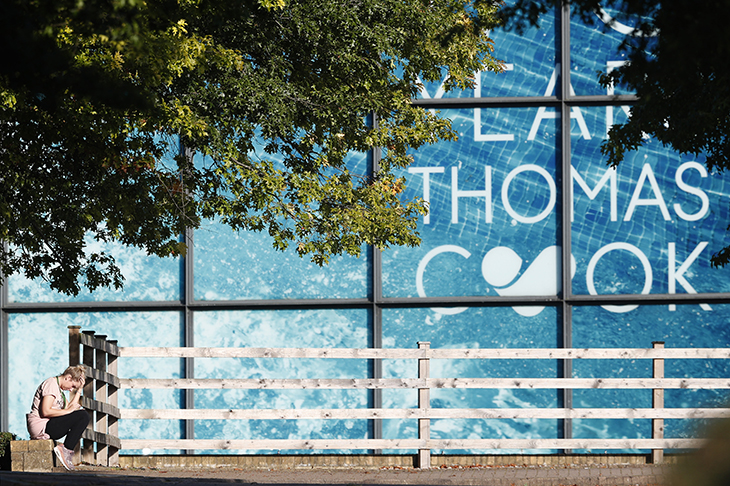It’s not obvious that the state has a moral obligation to repatriate holidaymakers whenever a tour operator goes bust, as Thomas Cook did on Sunday night. Being briefly stranded in a sangria-fuelled resort is not like being left behind in a war zone, after all. But when large numbers of tourists are involved such situations will swiftly become consular crises if government does nothing to help. So there’s pragmatic reason for ministers to act — as well as political motives that might have been scripted by Armando Iannucci for The Thick of It.
Here’s the scenario: a government in chaos under a prime minister who’s all over the Sunday papers for his ‘association’ with a blonde who is neither his wife nor his official mistress. Then: bingo! A household-name firm — run by a crew who the spin doctors can paint as greedy men with continental surnames — abandons 150,000 yeoman Brits abroad, some ‘held hostage’ in unpaid and probably insanitary hotels.
Cue ‘Operation Matterhorn’: Foreign Secretary Dominic Raab competing with Transport Secretary Grant Shapps to sound officer-like in what is in fact a deployment of the Civil Aviation Authority’s long-established levy-based Atol scheme (backed by £170 million of reserves in the Air Travel Trust) which covers everyone on package holidays; the Treasury will only pick up the bill for flight-only travellers with no other insurance.
In truth, the Cook collapse is far worse for 9,000 UK staff whose jobs are at risk than for customers or taxpayers. Overladen with debt, overtaken by modern travel trends, stung by the weak pound, this venture founded by a Victorian temperance campaigner had long passed its time. And there could be no question of a state bailout for the company itself (that’s clearly not the business of government, even if Spain and Turkey were willing to chip in for the sake of their tourism sectors) as opposed to a flurry of photo-op rescue flights.
Finally, if the management team that kept Cook afloat these past few years has awarded itself undeserved millions, that’s the way of the corporate world these days and I’ll be amazed if any of the loot can be clawed back after whatever inquiries ensue. In summary, an inevitable fall, a disruption for travellers and a disaster for Thomas Cook workers: but what a glorious distraction for a beleaguered government.
Sad departures
An emerging theme of the column this month is the departure — by death or retirement — of industrial heroes. Sir Michael Edwardes, who has died aged 88, was the British Leyland boss who kickstarted the revival of the moribund British car industry 40 years ago, first by confronting union power and transforming BL’s productivity, then by flying to Japan on Christmas Day 1979 to sign a joint venture with Honda that heralded a flood tide of inward investment. He lived long enough to see the definitive ebbing of that tide, symbolised by the closure of Honda’s Swindon plant.
As for this week’s most significant retirement, it is surely that of Jürgen Maier, chief executive of the German-owned Siemens UK manufacturing group, whom I have described here previously as ‘probably the most respected industrialist in the north of England’ and who has taken flak for ‘scaremongering’ about the impact of Brexit on industrial businesses. In April, Maier said he could no longer ‘defend the action of our parliament when reporting to my managing board, making it hard to win support for finely balanced investment decisions that in the end have an impact on UK jobs [and] innovation’. Still only 55 (and a committed Anglophile, having lived here since he was ten), he has chosen to step down with a final swipe at ‘politicians… who don’t lead with integrity’. Make of that what you will.
Sensible choice
Alison Rose has at last been named chief executive of RBS, succeeding Ross McEwan and becoming the first woman to run one of the UK’s ‘big four’ banks (the others being Barclays, HSBC and Lloyds) though not the first to reach the top if we also count Ana Botín of fifth-ranking Santander UK. Widely respected, having spent her entire career as a lending banker with RBS and its NatWest subsidiary, Rose was always the sensible choice. The mystery is why it took so long to confirm her appointment: I named her here as the frontrunner five months ago.
The answer, I’m told, is that the RBS board chaired by Sir Howard Davies was hoping an outside candidate with more international kudos, and more investment banking experience, might belatedly pop into the frame: perhaps someone such as ex-Deutsche Bank boss John Cryan, who has just become chairman of Man Group, the hedge-fund giant. But given RBS’s continuing lame-duck status, still two-thirds state-owned a decade after its bailout, and the relatively modest pay on offer — Rose’s £2.2 million salary-plus-shares package is well below the FTSE100 average — banking’s global big-shots all turned out to be too busy to call the headhunters back. Private shareholders hanging on for better times at RBS and wary of overhyped hired-in bosses will probably say thank goodness for that. Meanwhile I hope the wait hasn’t disheartened Alison Rose.
Daily special
For this week’s restaurant tip, I’m afraid I can’t recommend the set menu at Les Orangers Beach Resort in Hammamet, Tunisia, which is where Thomas Cook customers were reportedly being held hostage at the weekend, prevented from leaving until they coughed up again for holidays they had already paid for in advance via the bankrupt travel operator. When I stayed there many years ago I always ordered, out of curiosity, the daily ‘Tunisian speciality’; it was presented with many different names but was invariably the same dish of unidentifiable spiced meatballs, possibly camel.
Got something to add? Join the discussion and comment below.
Get 10 issues for just $10
Subscribe to The Spectator Australia today for the next 10 magazine issues, plus full online access, for just $10.
You might disagree with half of it, but you’ll enjoy reading all of it. Try your first month for free, then just $2 a week for the remainder of your first year.















Comments
Don't miss out
Join the conversation with other Spectator Australia readers. Subscribe to leave a comment.
SUBSCRIBEAlready a subscriber? Log in